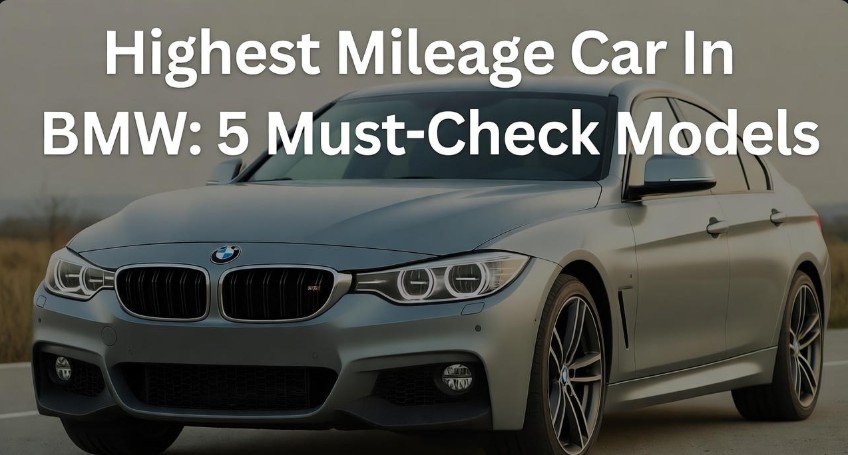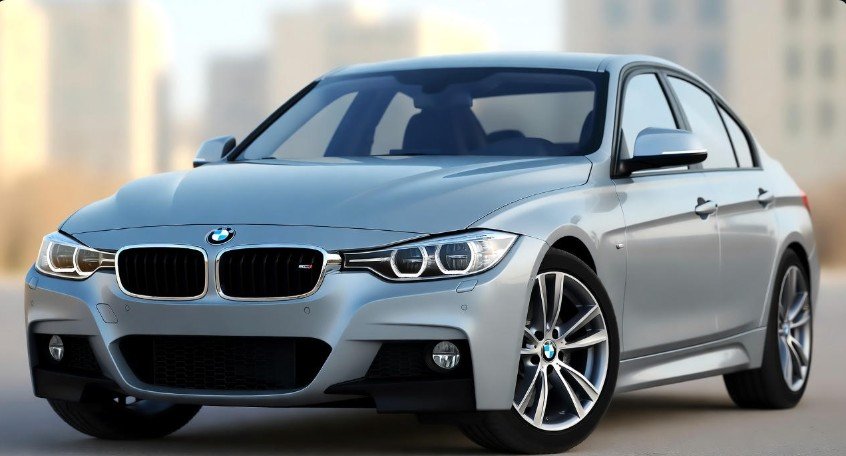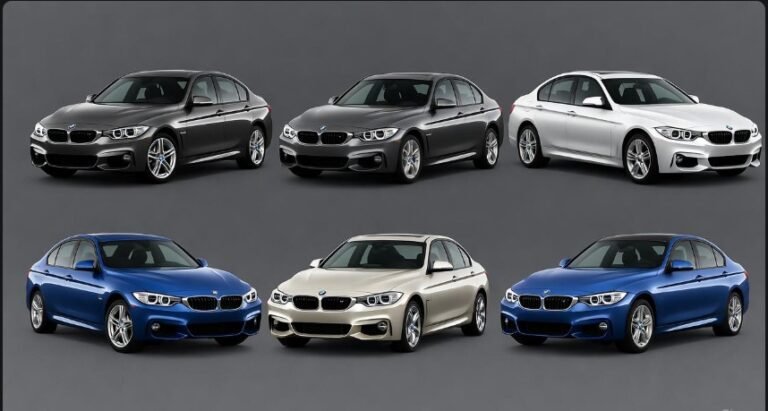Highest Mileage Car In BMW: 5 Must-Check Models

Looking for the highest mileage car in BMW doesn’t mean sacrificing luxury. Discover 5 BMW models renowned for their durability and long-term reliability, proving that premium performance can endure for hundreds of thousands of miles with proper care.
In This Article
- 1 Key Takeaways
- 2 Unlocking the Longevity of BMW: Finding the Highest Mileage Car in BMW
- 3 What Makes a BMW a High-Mileage Champion?
- 4 5 BMW Models Proven for High Mileage
- 5 Essential Maintenance for Maximizing Your BMW’s Lifespan
- 6 Understanding Your BMW’s Service Indicator
- 7 FAQs About High-Mileage BMWs
- 7.1 Q1: Can a BMW really last over 200,000 miles?
- 7.2 Q2: What are the most common high-mileage issues for BMWs?
- 7.3 Q3: Is it worth buying a high-mileage BMW?
- 7.4 Q4: What is the most reliable BMW engine for high mileage?
- 7.5 Q5: How often should I change the oil in a high-mileage BMW?
- 7.6 Q6: Are diesel BMWs better for high mileage?
- 8 The Road Ahead: Owning a High-Mileage BMW with Confidence
Key Takeaways
- Identify durable BMW models known for high mileage.
- Understand factors contributing to BMW longevity.
- Learn essential maintenance for maximizing BMW lifespan.
- Explore 5 specific BMW models with proven high-mileage potential.
- Gain confidence in choosing a long-lasting luxury vehicle.
Unlocking the Longevity of BMW: Finding the Highest Mileage Car in BMW
When you think of BMW, you likely picture exhilarating performance, sophisticated design, and cutting-edge technology. But for many drivers, a crucial consideration is how long these engineering marvels can last. The question of the highest mileage car in BMW is a common one, especially for those looking for a reliable pre-owned vehicle or simply aiming to maximize the life of their investment. It’s a topic that can feel complex, with varying opinions and a need for factual insights. At Automotives, we’re here to demystify this. We’ll guide you through what makes certain BMWs stand the test of time and highlight five specific models that have consistently proven their endurance, ensuring you can drive smarter and with more confidence.
What Makes a BMW a High-Mileage Champion?

BMW vehicles are built with a commitment to engineering excellence. Several factors contribute to their ability to achieve high mileage, often exceeding figures that might surprise casual observers. It’s a combination of robust powertrain design, quality materials, and sophisticated electronic systems. However, like any high-performance machine, consistent and diligent maintenance is the absolute key to unlocking their full lifespan. Ignoring routine service can significantly shorten a car’s life, regardless of its brand prestige. Understanding the core components and their recommended care is paramount.
Engine Durability and Design
BMW’s engines, particularly their inline-six and V8 configurations, are legendary for their robust construction. Many of these engines feature closed-deck designs and high-quality internal components that can withstand significant stress and mileage. The focus on precision engineering means that when these engines are properly maintained, they can often achieve well over 200,000 miles, and in many cases, even surpass 300,000 miles. Regular oil changes with the correct synthetic oil, maintaining proper coolant levels, and addressing any potential leaks promptly are critical. The advanced engine management systems also help optimize performance and longevity when sensors and software are kept up-to-date.
Transmission and Drivetrain Strength
Whether it’s a manual or an automatic transmission, BMW typically equips its vehicles with strong, durable units. The ZF automatic transmissions, in particular, are highly regarded for their smooth operation and longevity. Regular transmission fluid and filter changes, as recommended by BMW or a trusted mechanic, are essential to prevent wear and tear. For all-wheel-drive (xDrive) systems, ensuring the differential and transfer case fluids are serviced according to schedule is equally important for overall drivetrain health and high-mileage potential.
Chassis and Build Quality
The structural integrity of a BMW is another significant factor. The use of high-strength steel and advanced manufacturing techniques results in a chassis that resists corrosion and maintains its rigidity over many years and miles. While rust can be a concern in certain climates, comprehensive underbody protection and regular washing, especially after exposure to road salt in winter, can significantly extend the car’s life. The quality of interior materials also tends to hold up well, contributing to a lasting premium feel.
Electrical Systems and Technology
Modern BMWs are packed with sophisticated electronics. While these systems offer unparalleled functionality, they can sometimes be a source of concern for high-mileage vehicles. However, BMW’s electrical engineering is generally robust. Common issues, like sensor failures or module malfunctions, are often addressed through software updates or component replacements. Proactive identification of small electrical gremlins before they escalate can prevent more significant problems down the line. Keeping abreast of recalls and service bulletins is also a good practice.
5 BMW Models Proven for High Mileage
While many BMWs are built to last, certain models have earned a reputation for exceptional durability and a long service life. These are vehicles where owners frequently report achieving hundreds of thousands of miles with proper care, making them excellent candidates for the “highest mileage car in BMW” title. Here are five models that consistently stand out:
1. BMW 3 Series (E46, E90 Generations)
The BMW 3 Series is often considered the heart and soul of the brand, and models from the E46 (1998-2006) and E90 (2005-2013) generations are particularly known for their resilience. These generations feature some of BMW’s most beloved and durable engines, like the M54 inline-six and the N52. These engines, when maintained diligently with regular oil changes and cooling system checks, are capable of impressive longevity. The 3 Series chassis is also well-engineered, providing a balanced driving experience that many owners cherish for years. Owners frequently report reaching 200,000 to 300,000 miles and beyond.
Pros of E46/E90 3 Series for High Mileage:
- Robust inline-six engines (M54, N52)
- Excellent driving dynamics
- Extensive aftermarket support
- Relatively simpler electronics compared to newer models
Cons to Consider:
- Potential for oil gasket leaks
- Cooling system components can wear over time
- Rust can be an issue in certain climates
2. BMW 5 Series (E39, E60 Generations)
The BMW 5 Series represents a step up in luxury and size from the 3 Series, and models from the E39 (1995-2003) and E60 (2003-2010) generations are also strong contenders for high-mileage success. The E39, in particular, with its iconic M52 and M62 engines, is revered for its bulletproof reliability. The E60 generation, while introducing more complex electronics, still offered durable powertrains, especially those equipped with the N52 or N55 engines. These vehicles offer a more refined ride and greater comfort for long-distance driving, making them ideal for those who rack up miles.
Table: BMW 5 Series E39 vs. E60 High-Mileage Considerations
| Feature | E39 (1995-2003) | E60 (2003-2010) |
|---|---|---|
| Popular Engines | M52TU (inline-6), M62 (V8) | N52 (inline-6), M54 (inline-6), N55 (inline-6), V8 variants |
| Known Strengths for Longevity | Proven engine durability, simpler systems | Strong inline-6 engines, refined ride |
| Potential High-Mileage Issues | Vanos seals, cooling system | Fuel injectors, electric water pump (early models), iDrive system |
| Typical High Mileage Achieved | 200,000 – 300,000+ miles | 150,000 – 250,000+ miles |
The E39’s mechanical simplicity is a significant advantage for long-term ownership, while the E60 offers more modern features but requires careful attention to its more complex electronic systems and components.
3. BMW X5 (E53, E70 Generations)
For those needing an SUV, the BMW X5 has also demonstrated impressive longevity, especially models from the first generation (E53, 2000-2006) and the second generation (E70, 2006-2013). These vehicles share many of their core powertrain components with their sedan counterparts, meaning the robust inline-six and V8 engines can achieve high mileage. The E53 is particularly appreciated for its sturdy build and relatively straightforward mechanics for an SUV of its era. The E70, while more technologically advanced, still offers durable engines like the N55 and N62 V8. Regular servicing of the xDrive system and suspension components is crucial for maintaining these heavier vehicles over the long haul.
Key Maintenance for High-Mileage X5s:
- Regular differential and transfer case fluid changes.
- Suspension component inspections (bushings, control arms).
- Cooling system maintenance is critical for SUVs.
- Exhaust system checks for rust in humid or salty environments.
4. BMW 7 Series (E38, E65/E66 Generations)
The flagship 7 Series, despite its luxury appointments and complex technology, has models that can achieve remarkable mileage. The E38 (1994-2001) is often lauded for its robust construction and reliable V8 (M62) and V12 (M73) engines, which can be incredibly durable when properly maintained. The subsequent E65/E66 generation (2001-2008), while introducing the polarizing “flame surfacing” design and iDrive, also featured strong V8 and V12 engines. Precision in maintenance, especially regarding the complex hydraulic systems, air suspension (on some models), and advanced electronics, is the key to longevity for these executive sedans.
Considerations for High-Mileage 7 Series:
- Air suspension systems require diligent monitoring.
- Regular comprehensive inspections of all fluid systems.
- Software updates for complex electronics are important.
- The V12 engines, while powerful, can be more costly to maintain.
For those seeking the highest mileage car in BMW within the luxury sedan segment, a well-maintained E38 or a carefully inspected E65/E66 can still offer a luxurious and enduring experience.
5. BMW Z4 (E85/E86 Generation)
While often seen as a sporty roadster, the first-generation BMW Z4 (E85 convertible, E86 coupe, 2002-2008) is built with the same robust engineering principles as its sedan and SUV siblings. The inline-six engines found in many Z4 models, such as the M54 and later N52, are known for their durability. The Z4’s mechanical components are generally solid, and its simpler design compared to larger BMWs can sometimes translate to fewer complex issues as mileage increases. Regular fluid changes, particularly for the engine and differential, are paramount. The engaging driving experience it offers can certainly motivate owners to keep it running for many years and miles.
Why the Z4 E85/E86 Can Go the Distance:
- Durable and responsive inline-six engines.
- Strong chassis design for a sporty car.
- Fewer complex electronic systems than larger BMWs.
- Requires less frequent service for components like AWD systems.
Essential Maintenance for Maximizing Your BMW’s Lifespan
Achieving high mileage in any car, especially a premium one like a BMW, boils down to one critical factor: consistent, quality maintenance. It’s not just about oil changes; it’s a holistic approach to car care. Following your BMW’s service schedule is the foundation, but understanding what goes into that schedule and being proactive can make all the difference. For an in-depth look at BMW maintenance schedules, consult the official BMW USA website or your owner’s manual.
The Cornerstone: Regular Oil Changes
This is non-negotiable. BMW engines are high-performance machines that require clean, high-quality synthetic oil to operate optimally. Always use the oil viscosity and specifications recommended by BMW. Shorter intervals than recommended, especially if you drive in harsh conditions (stop-and-go traffic, extreme temperatures), can be beneficial. Clean oil lubricates, cools, and cleans the engine. Neglecting this is a fast track to premature engine wear.
Cooling System Vigilance
BMW cooling systems, particularly those with electric water pumps and complex plastic components, need attention. Overheating can cause catastrophic engine damage. Regularly check coolant levels, inspect hoses for cracks or leaks, and be aware of the typical lifespan of components like the thermostat and water pump. Replacing these parts proactively, before they fail, can save you from a much larger repair bill.
Transmission Fluid Service
While some manufacturers claim “lifetime” transmission fluid, this is rarely true for high-performance vehicles. For automatic transmissions, changing the fluid and filter at recommended intervals (typically between 60,000 and 100,000 miles, depending on the model and driving conditions) is crucial for smooth operation and longevity. Manual transmissions also benefit from fluid changes.
Brake System Health
Beyond pad and rotor replacement, regularly inspecting brake fluid, lines, and calipers is important. Brake fluid can absorb moisture over time, reducing its effectiveness and potentially causing corrosion within the system. A complete brake fluid flush every few years is a good preventative measure.
Suspension and Steering Components
As mileage increases, suspension components like bushings, control arms, ball joints, and shock absorbers/struts will naturally wear. Listen for unusual noises (clunks, rattles) and address any looseness or play in the steering. Worn suspension can affect handling, tire wear, and ride comfort.
Electrical System Checks
Keep an eye on your dashboard warning lights. Small issues, like a failing sensor or a weak battery, can sometimes lead to larger problems if left unaddressed. Regular battery checks are also vital, as a failing battery can cause erratic behavior in various electronic modules.
Pro Tip:
When buying a used BMW with significant mileage, always ask for detailed service records. A car with a documented history of meticulous maintenance is a much safer bet than one with unknown upkeep.
Understanding Your BMW’s Service Indicator
Most modern BMWs feature a condition-based service (CBS) system. Instead of fixed intervals, the car’s computer monitors driving style, mileage, and time to determine when specific services are needed. This system is quite sophisticated and can accurately predict when items like brake pads, brake fluid, engine oil, and coolant need attention. Pay close attention to the messages on your iDrive screen or instrument cluster. While the CBS is generally reliable, it’s still wise to supplement its recommendations with your own visual inspections and by consulting with a trusted BMW technician.
FAQs About High-Mileage BMWs
Q1: Can a BMW really last over 200,000 miles?
Absolutely. With consistent, high-quality maintenance, many BMWs, especially those with well-regarded engines like the M54 or N52, can easily surpass 200,000 miles and often reach 300,000 miles or more.
Q2: What are the most common high-mileage issues for BMWs?
Common concerns include oil leaks (valve cover gaskets, oil pan gaskets), cooling system component wear (water pump, thermostat, hoses), and for older models, rust. More complex electronics on newer models can also present occasional issues.
Q3: Is it worth buying a high-mileage BMW?
It can be, especially if the vehicle has a solid maintenance history. The savings on the initial purchase price can be significant, but be prepared for potential maintenance costs as components age.
Q4: What is the most reliable BMW engine for high mileage?
BMW’s naturally aspirated inline-six engines, such as the M54 (found in many E46 3 Series and early E39 5 Series) and the N52 (found in many E90 3 Series and E60 5 Series), are widely considered among their most reliable and durable for high mileage.
Q5: How often should I change the oil in a high-mileage BMW?
While BMW’s CBS system is advanced, for high-mileage vehicles or those driven hard, consider more frequent oil changes than the system suggests—perhaps every 5,000-7,500 miles with high-quality synthetic oil.
Q6: Are diesel BMWs better for high mileage?
Historically, BMW diesel engines have been known for exceptional durability and torque, often achieving very high mileage. However, availability and specific maintenance needs vary by model and market, and emissions regulations have impacted their prevalence in the US.
The Road Ahead: Owning a High-Mileage BMW with Confidence
Choosing the highest mileage car in BMW isn’t about finding a vehicle that miraculously defies wear and tear. It’s about understanding the inherent engineering strengths of certain models and committing to a proactive, diligent maintenance regimen. The BMW 3 Series, 5 Series, X5, 7 Series, and even the Z4, when chosen from generations known for their robust powertrains and build quality, can offer hundreds of thousands of miles of driving pleasure. By focusing on regular servicing, addressing potential issues early, and using quality parts and fluids, you can confidently own and enjoy a BMW that not only performs beautifully but also stands the test of time. Drive smart, maintain well, and enjoy the enduring legacy of BMW engineering on your journeys across the USA.






